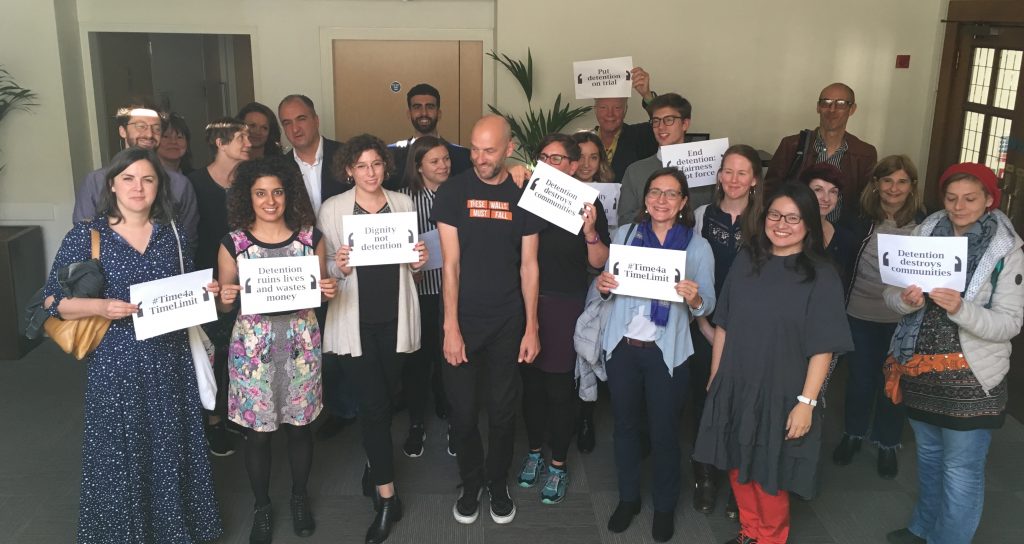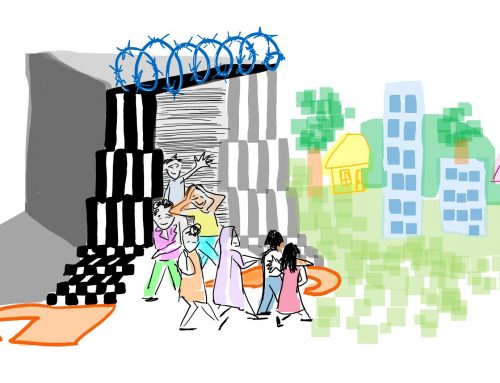Once a year, the Detention Forum hosts a reflection event for our members. It takes a lot of effort to organise it, but it is always worth it. Challenging immigration detention is exhausting. So celebrating our collaboration, reaffirming our purpose and preparing for the next stage gives us strength and courage to keep us going. This year, we extended our invitation to some non-members to expand our circle of conversation.
Looking forward to working with colleagues at the @DetentionForum quarterly meeting today as we continue our work to #EndIndefiniteDetention#Time4aTimeLimit pic.twitter.com/0SO3cwszWj
— JRS UK (@JRSUK) September 25, 2018
Nearly 50 people gathered in late September in a conference room made available by the kind people at Friends House to continue our quest for a 28 day time limit for all.
Great to be with so many people at @DetentionForum BIG quarterly meeting today, sharing learning and planning to achieve radical detention reform #time4atimelimit pic.twitter.com/1yKwkEoHDb
— Lisa Matthews (@LisaMatthewsRtR) September 25, 2018
There was a special urgency to the event this year. The Home Secretary’s response to the much-awaited follow-up Shaw Review radically altered our advocacy environment. The announced programme of “innovative reforms” includes an alternative to detention pilot and an internal policy review of a time limit. The latter comes at a particularly sensitive period before the Immigration Bill and is an intriguing move: not so long ago, the Immigration Minister was at pains to insist that there is no such thing as indefinite detention in the UK and there was absolutely no need for a time limit. Why this change? And is this an opportunity, a risk, or both?
Lots of activity at @DetentionForum meeting this morning. Now hearing from a great panel about opportunities and risks post #shawreview. #Time4aTimeLimit pic.twitter.com/oYS7xZPKT6
— ScotDetaineeVisitors (@SDVisitors) September 25, 2018
We started the day with taking stock of our achievements over the last 12 months, led by Jonathan Ellis whom we regularly commission to help us. An impressive range of members’ actions were captured on Post-It notes and were neatly arranged on our joint Theory of Change flipchart. They included:
- Helped to plan and deliver The Channel project in Bristol – a voice message exchange between people in detention and communities in Bristol.
- Worked collaboratively to convince HASC that revelations at Brook House were not a one-off but a result of systemic issues within detention, leading to a broader inquiry.
- Sent regular briefings on detention to MSPs and officials in Scottish Parliament.
- Launched our ‘Never truly free’ report at a parliamentary roundtable.
- Participated in the Shaw review, specifically around vulnerability in detention and ATDs.
The next panel discussion was expertly chaired by Jon Featonby (British Red Cross), with contributions from Tamsin Alger (Detention Action), expert-by-experience Vivian (not her real name) and Gemma Lousley (Women for Refugee Women). We covered the topics of vulnerability, alternatives to detention and the Home Office internal review on time limits, to identify strengths, weaknesses, opportunities and threats that we face as we continue to advocate for a 28 day time limit. Attempting to understand how these seemingly isolated topics interact with each other politically and also in the realm of the Home Office operation is important to us.
I led the next section, supported by Jon (again) and Lisa Matthews (Right to Remain), tracing the history of a remarkable change in how immigration detention is seen in this country since we started working together in 2009. As I was preparing the slides very late the night before, I smiled at the memory of all the (crazy) things we’ve done together with such comradeship and goodwill. And all the successes, surprises and challenges we’ve experienced together. The slides showed that we have been fortunate with creativity, collaboration, solidarity, diversity, honesty and passion, which was generously shared. We then reconsidered what it is that we each need to focus on in the run up to the Immigration Bill.
The campaign #time4atimelimit is such a great example of an effective & inclusive campaign @DetentionForum …. https://t.co/MHLWjguP3p
— Jonathan Ellis (@JonathanMHEllis) September 25, 2018
After lunch, Mishka from the Freed Voices got the participants to get stuck into a role play exercise to defend a 28 day time limit for all. Freed Voices ran a ’28 day time limit on trial’ session earlier where each of them played the roles of judge, defense lawyer, prosecution and expert witnesses. The session was wild and gave us much to think about, in terms of needing to strengthen our argument. The key learning from that session was that simply demanding a time limit is no longer enough: we need to be ready to justify our ask and rebut objections. The participants were given four difficult scenarios to work with, and it looks like they enjoyed playing the role of a NGO representative and the Home Secretary. We also looked at our negotiation strategy work which has been going on for some months.
#FreedVoices are putting a 28 day time limit on trial at our big quarterly meeting today.
It's #Time4aTimeLimit – but what does this look like in practice? pic.twitter.com/6HuHNtKPir
— TheDetentionForum (@DetentionForum) September 25, 2018
Interesting experience at the @DetentionForum quarterly meeting practicing conversations with Home Office ministers about why it's #time4atimelimit. Came up against a very fair Home Secretary in @leilazadeh, not sure I quite managed to persuade her though.
— Jon Featonby (@jonfeatonby) September 25, 2018
This was followed by a session on communications. Sam Grant (Liberty) shared learnings from a piece of work done by Britain Thinks on messaging on ending indefinite detention. We then split into two small workshops, one on the These Walls Must Fall campaign and another on exploring how we should talk about people with previous convictions who are in immigration detention. When the Detention Forum produced our first Theory of Change, we knew communications were important but we had no idea what that meant. It took us one year of meetings and discussions to agree on our key message, which is just a short paragraph. Thankfully, we still use this key message which was, to our great surprise, recently featured in the Commons Library briefing paper on immigration detention. This session must have been the first time ever when Sir David Attenborough and Sir Cliff Richards were mentioned in the context of anti-detention campaigning work.
Looking forward to a collaborative day of campaign planning with fellow @DetentionForum members talking about why it’s #time4atimelimit on immigration detention. I’ll be leading a session on how to message to different audiences and err…Sir David Attenborough.
— Sam Grant (@Sammy_G1988) September 25, 2018
Fantastic @DetentionForum meeting today. Never thought I’d speak about Cliff Richard in a meeting about #Time4aTimeLimit (specifically right to privacy of people with previous convictions held under immigration powers) but here we are ??♂️
— Maddy Crowther (@CrowtherMaddy) September 25, 2018
Before heading to a pub, we asked everyone to write on a piece of paper at least one action they will be taking after the meeting to support radical detention reform. Trying to find solutions and not be paralyzed by risks, fear and perfectionism doesn’t come naturally. But these habits do eventually become culture – and the culture within the Detention Forum is that of “we have to make it work”, even when we know that change will be very very difficult. This is also related to one idea we’ve come to learn over the years: if you want social justice, you need to master hope; it’s our professional and moral requirement. As Rebecca Solnit says in Hope in the Dark, “Hope just means another world might be possible, not promise, not guaranteed. Hope calls for action; action is impossible without hope.”
The Detention Forum is extremely privileged to have worked with so many members and we will continue to take action together – a big thank you to everyone who joined us.
Thanks to everyone who participated in and shaped yesterday's BIG #Time4aTimeLimit meeting. Great discussions and so much energy. We hope you are taking your next/new step towards ending indefinite immigration #detention TODAY. pic.twitter.com/nA0K8KkFZI
— TheDetentionForum (@DetentionForum) September 26, 2018
By Eiri Ohtani, @EiriOhtani





